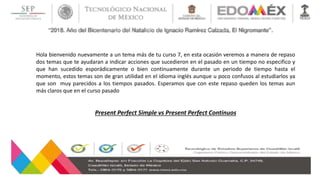
Present Perfect vs Present Perfect Progressive
- 1. Hola bienvenido nuevamente a un tema más de tu curso 7, en esta ocasión veremos a manera de repaso dos temas que te ayudaran a indicar acciones que sucedieron en el pasado en un tiempo no especifico y que han sucedido esporádicamente o bien continuamente durante un periodo de tiempo hasta el momento, estos temas son de gran utilidad en el idioma inglés aunque u poco confusos al estudiarlos ya que son muy parecidos a los tiempos pasados. Esperamos que con este repaso queden los temas aun más claros que en el curso pasado Present Perfect Simple vs Present Perfect Continuos
- 2. Present Perfect Simple • The Present Perfect Simple is used: • To talk about an action which happened in the past, but the exact time is not mentioned. Ex: I’ve already done that • To talk about a state which started i the past and continuous uo to the present Ex: Mary has had her dog since September. • To talk about an action that happened in the past and finished, but the results are obvious in the present. Ex: I’ve finished my Project and I have more free time now, Tim has washed his car (Now it’s cleaned)
- 3. Time Expressions for Present Perfect Just, yet, already, ever, never, before, always, how long, for, since, recently,lately, once, twice, so, far, etc. Here you have some examples using these expressions: I’ve had this car since 2004 Julia has changed Jobs three times since she came to Luton I’ve been to the cinema twice this week I’ve just taken a shower, my hair is still wet I’ve never been there, have you? She has already gone to the supermarket, the groceries are over there He hasn’t arrived yet, it’s too late We haven’t gone to the cinema recently, we haven´t had enough time Structure: I have worked He has slept Have you worked? Has she slept? They haven’t worked It hasn´t slept
- 4. Present Perfect Progressive • The Present Perfect Progressive is used: • To emphasise the duration of a state or action which started in the past and continues up to the present. Ex: I’ve been learning English for 6 years • To talk about an action which happened over a period of time in the past and may have finished, but the results are obvious in the present. Ex: We’ve been walking around all day. That’s why we’re so tired Structure: I have been working He has been sleeping Have you been working? Has she been sleeping? They haven’t been working It hasn’t been sleeping
- 5. Time Expressions For, since, how long, all day/week,etc. I’ve called him three times this morning I’ve been calling him since 9 o´clock He has been studying for his exam all day, it’s going to be very difficult She has been taking French classes for a long time
- 6. Now let’s practice this topic with an exercise A. Solve the exercise (PRACTICE)
- 8. Como pudiste observar estos temas son un repaso de lo que ya has visto en cursos anteriores, son sobre todo para consolidar el conocimiento y que lo veas de manera mas practica, ver su uso por ejemplo en lecturas o ejercicios un poco mas complejos, esto te permitirá verificar si efectivamente estamos ayudándote a reconocer estos tiempos tan esenciales en el idioma inglés. Es importante que resuelvas tus ejercicios de manera individual y a conciencia ya que esto te permitirá verificar que es lo que esta fallando o en que debes poner especial atención. Si tienes alguna duda sobre el tema o los ejercicios no dudes en consultar a l profesor a cargo del grupo, que quien gusto te apoyara Suerte en tu próxima lección y aquí te dejamos las respuestas del ejercicio para que verifiques tus resultados y te autoevalúes, recuerda que en esta presentación encontraras la lectura la cual te ayudara a resolver los ejercicios correspondientes a la tarea asignada en esta misma semana con el nombre de READING Practice 1. have always wanted 2. gave 3. ‘ve been 4.have enjoyed/have been enjoying 5.have been rehearsing 6. has been studying 7. has designed 8. went
- 9. TECNOLÓGICO DE ESTUDIOS SUPERIORES DE CUAUTITLAN IZCALLI (TESCI)